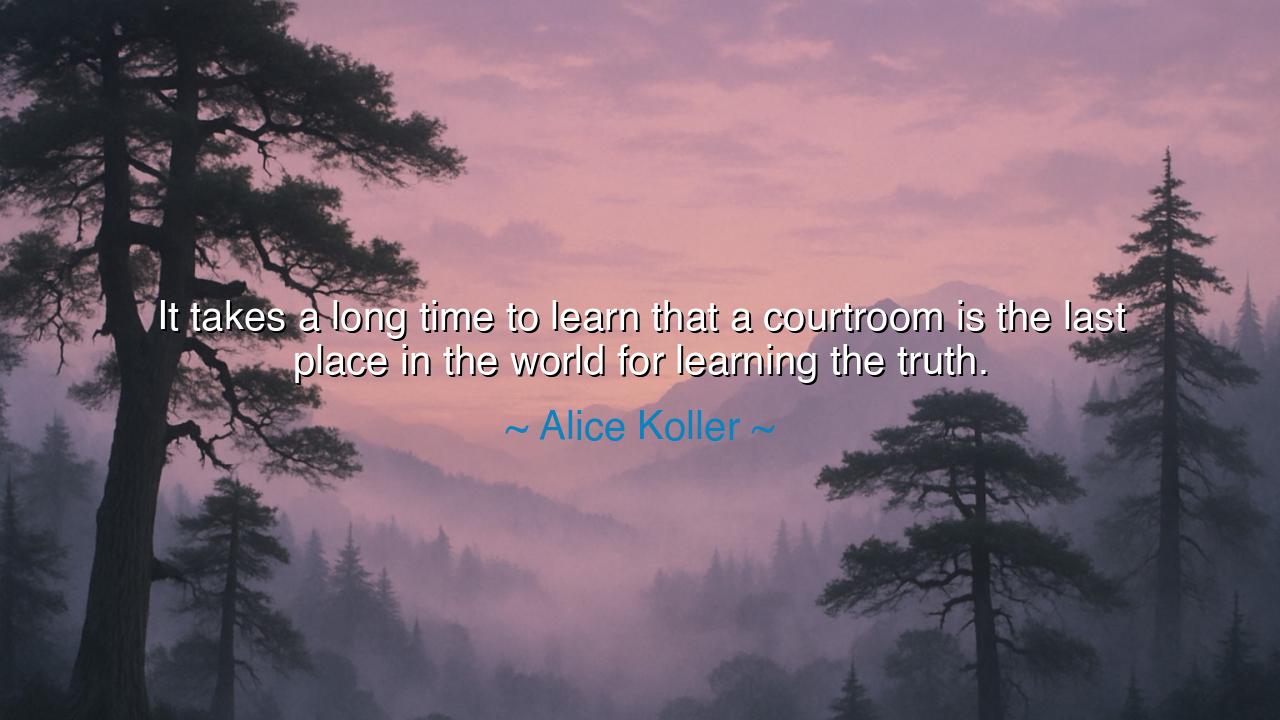
It takes a long time to learn that a courtroom is the last place
It takes a long time to learn that a courtroom is the last place in the world for learning the truth.






“It takes a long time to learn that a courtroom is the last place in the world for learning the truth.” – Alice Koller
There are words that carry the weight of ages, and this saying by Alice Koller is one of them — a quiet thunder that rolls through the chambers of human justice. The courtroom, that solemn hall where men and women swear to uphold truth, is often mistaken for its dwelling place. Yet Koller reminds us that truth and justice are not always the same thing. Truth is pure, unchanging, and eternal — but justice, as shaped by human hands, is fragile and flawed, swayed by power, persuasion, and pride. The truth is the light of heaven, but the courtroom is a room lit by candles — flickering, uncertain, vulnerable to the winds of human error.
In the ancient world, the wise knew this well. The philosopher Socrates, accused of corrupting the youth of Athens, stood in a court that claimed to seek justice. Yet what unfolded was not a search for truth, but a contest of rhetoric, fear, and prejudice. Socrates spoke truthfully, yet it was his truthfulness that condemned him. The courtroom, filled with judges and citizens, failed to see the soul of the man before them; they saw only a threat to their comfort. Thus, he drank the hemlock — not because truth was absent from his heart, but because the court had no ears to hear it. From that day, the world learned — but forgot — that the truth is often too large to fit inside the walls of judgment.
The courtroom is a theater where language, not truth, holds the power. Each advocate seeks not what is, but what can be proven. Witnesses are filtered through memory, evidence through interpretation, and the story of the world is rewritten by those who speak loudest and clearest. The robes of law are meant to symbolize fairness, yet beneath them dwell the same passions that rule all men — ambition, fear, pride, and desire. Thus, it takes a long time to learn that the courtroom, though cloaked in the name of justice, is but a mirror of the flawed hearts that fill it.
Koller’s wisdom comes not from cynicism, but from sorrowful insight. To live long enough, to watch the machinery of justice grind away at truth, is to see how fragile honesty becomes when measured by law. One might believe that evidence, argument, and procedure can deliver the truth — yet truth is not a document or a testimony. It is an essence, a living flame that dwells beyond the reach of reason’s instruments. The courtroom deals in facts; truth, however, is born of the soul.
Consider the story of Galileo Galilei, who stood before the Inquisition for daring to say that the Earth moves around the Sun. The courtroom was grand, filled with robes and crosses, yet it was blind. Galileo had truth in his hands — but the law of his time forbade him to hold it aloft. They forced him to recant, to say what he did not believe, so that the court might preserve its dignity. And though the judgment silenced his voice, the truth did not die. It merely waited — patient and eternal — until the court’s authority crumbled to dust. This is the lesson of history: truth needs no courtroom; it outlives them all.
So what, then, shall we learn from Koller’s words? That the search for truth must begin within, not in the halls of men’s judgment. Let us not mistake the trappings of authority for the presence of wisdom. Let us seek truth not in verdicts, but in understanding; not in punishment, but in compassion. To know the truth, one must listen more than argue, reflect more than accuse, and love more than condemn. The truth, unlike law, cannot be forced — it must be revealed.
Therefore, my children, when you find yourselves in dispute, remember this teaching: do not look to the courtroom to uncover the heart of what is right. The law may settle conflicts, but only truth can heal them. Be seekers of truth in your speech, your judgments, your dealings with others. Speak not to win, but to understand. Listen not to defend, but to discern. For in this world of noise and conflict, those who pursue truth beyond the reach of the gavel walk in the light that no verdict can extinguish.
For the courtroom may declare who is guilty or free, but only the heart, purified by honesty and humility, can declare who is true.






AAdministratorAdministrator
Welcome, honored guests. Please leave a comment, we will respond soon